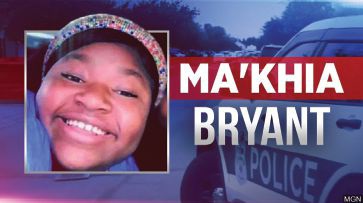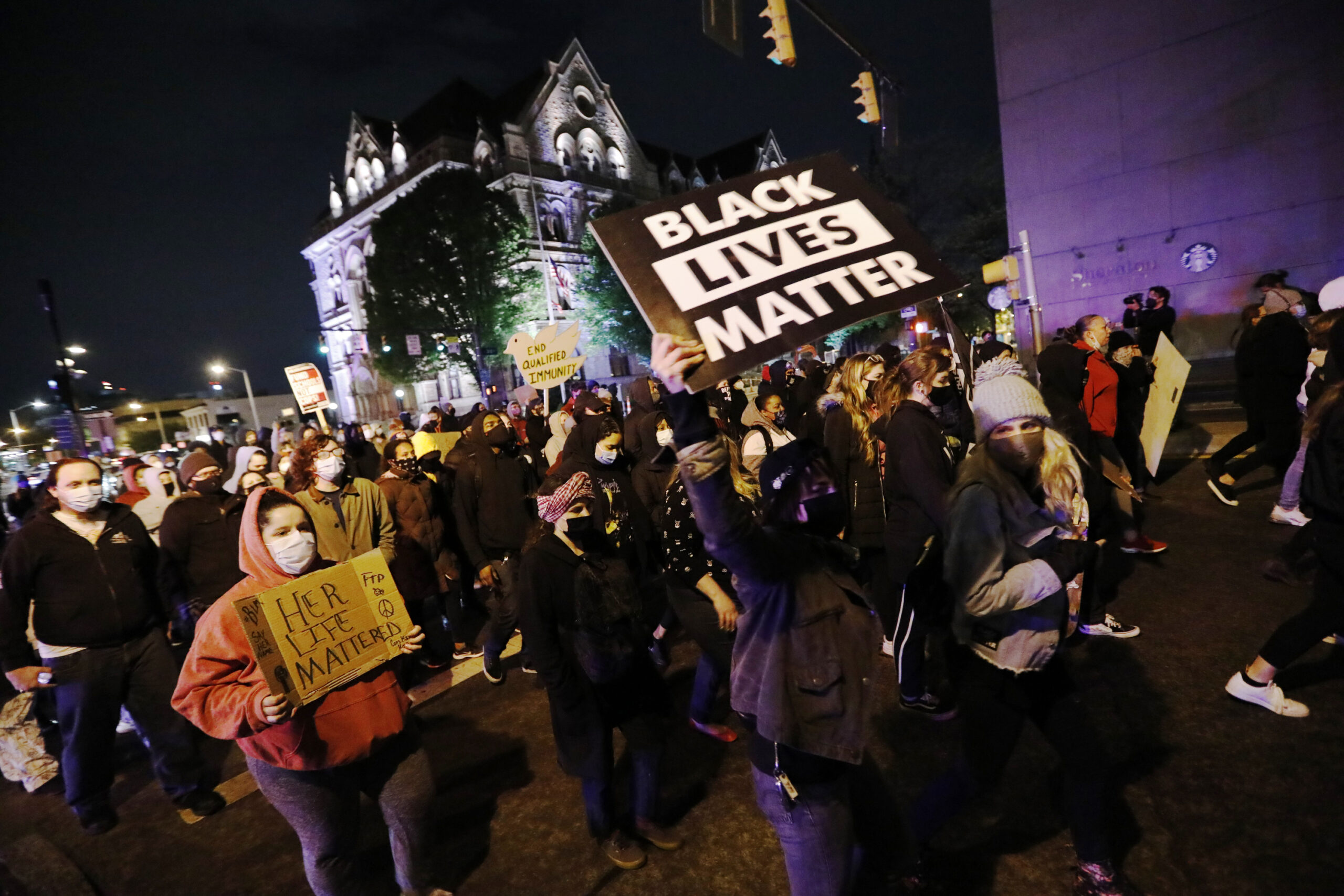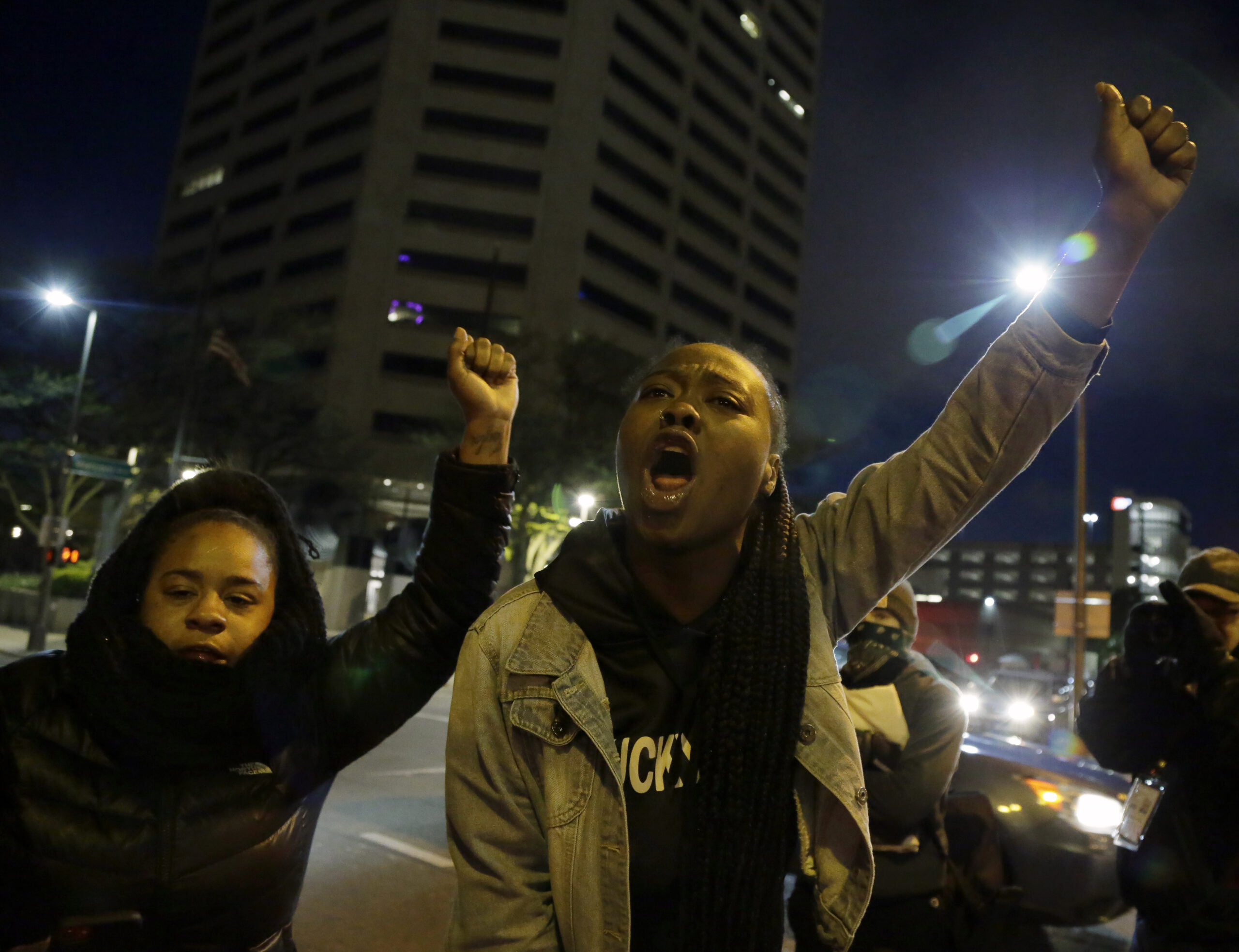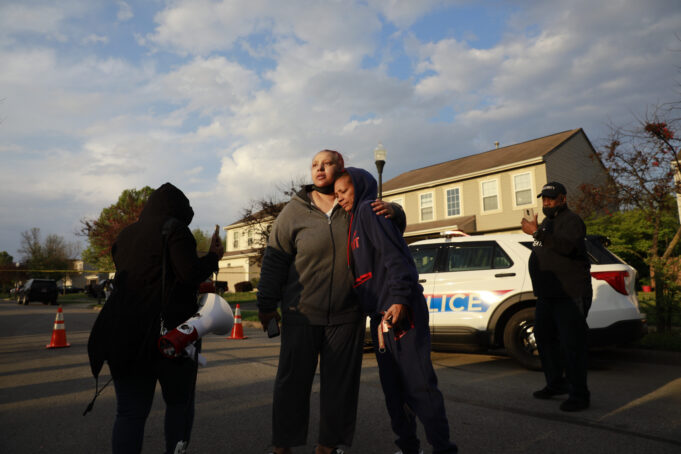Photo: Angela Harrelson, right, aunt of George Floyd, talks to supporters at George Floyd Square after a guilty verdict was announced at the trial of former Minneapolis police Officer Derek Chauvin for the 2020 death of Floyd, April 20, in Minneapolis. Chauvin has been convicted of murder and manslaughter in the death of Floyd. AP Photo/Julio Cortez

Dennis Muhammad was waiting for the verdict in the Derek Chauvin trial, the former Minneapolis, Minn. officer who knelt on George Floyd’s neck for nine minutes and 29 seconds until he died, when Ma’Khia Bryant was shot and killed by Columbus, Ohio police.
“The newsflash came across while watching the verdict. I got this citizen’s app that let me know when something’s in my neighborhood. And so my wife came home and said, ‘Did you know the police are right down the corner? Something happened.’ And I said, ‘What?’ Then I looked and I realized, a (16) year old was shot and killed by the police. They didn’t have a lot of information at the time, but I could hear them, ‘No justice, no peace,’ ” the Columbus resident and organizer told The Final Call.
Mr. Muhammad, founder of the Peacekeepers Global Initiative, a plan to promote peace and safety in the Black community, lives about a block from where Ma’Khia Bryant, a Black teenager, was shot and killed by Officer Nicholas Reardon. The officer was responding to a 911 call about an attempted stabbing. Shortly after the shooting, protesters gathered at the scene and expressed their anger and heartbreak well into the night.
Less than six hours later, police released bodycam footage of the incident.

The footage shows a chaotic scene. When Officer Reardon arrives, he doesn’t identify himself as a police officer. Footage shows Ma’Khia swinging at a woman, who falls to the ground, and a man kicks her. The officer shouts to get down, and Ma’Khia goes after a woman in pink, who is pinned against a car. The officer then fires four shots. Police say Ma’Khia had a knife, which was found on the sidewalk next to her body.
“My heart is broken. My heart is really broken right now, because I miss my baby, to be honest. I miss her already, and it’s really hard for me. I haven’t eaten, and I can’t eat because I miss my baby,” Paula Bryant, Ma’Khia’s mother, told CNN, in tears. “I have a beautiful baby, and she was taken from me. She was taken from me. I want the world to know that Ma’Khia was beautiful. She was humble. She loved to look after people.”
Ma’Khia was in the foster care system, but her cousin, Don Bryant, said she and her mother loved each other. In the days following what happened, the Bryant family released a statement. “Ma’Khia was a good student, a good person, and did not deserve what happened to her. We want to remind everyone Ma’Khia was only a 16-year-old teenage girl. We are deeply disturbed by the disproportionate and unjustified use of force in this situation,” the family said. “And while we remain encouraged by public support and all of the prayers shared with us, at the end of the day, we know nothing will bring back our beloved Ma’Khia. We respectfully request justice for Ma’Khia Bryant.”

According to a CNN story April 22, the teenager argued about housekeeping with young women visiting her home before the fatal police shooting.
Angela Moore told CNN two former foster children came to visit and celebrate her birthday. But they argued with Ma’Khia about “keeping the house clean,” she said. “So that’s how it all started.”
Ms. Moore said the account of what happened came from one of the young women who was at her home. “They argue all the time,” Ms. Moore told CNN, “but I never thought it would escalate like that.”
After the fatal encounter with police, Ms. Moore told CNN a desperate call came to her. According to CNN, it was “from one of the former foster children, who is seen in police body camera footage wearing pink and recoiling as Ma’Khia lunges at her with a shimmering knife.”
“Mom, get home. Where are you? They’re going crazy,” Ms. Moore said the young woman told her, in the CNN account. “She said they shot Ma’Khia and I said, ‘Huh?’ It was just crazy. … I never in my worst nightmare would have thought it would ever come to this,” Ms. Moore told CNN. “She liked to dance. She did chores around the house,” she added.
Officer Reardon has been on the force since December 2019 and has been relieved of street duty as the investigation continues. The Bureau of Criminal Investigation is conducting the probe, said a Columbus official.
Dr. Sydney McKinney, the executive director of the National Black Women’s Justice Institute, expressed to The Final Call that the incident reminds her that Black women and girls are too often criminalized instead of protected in situations when they are seeking help.
“Black girls are perceived to be threats. And that’s especially the case by law enforcement. Police don’t see Black girls as deserving of help or compassion, and that can’t be fixed by more training. Training can’t dismantle the racist and sexist beliefs that our police hold about Black girls,” she said. “And until we dismantle those beliefs, we’re going to continue to see these horrific acts of violence by police. We need police officers to recognize the humanity of Black girls and see them for who they are, which is brilliant and joyful and full of life.”
In general, Black girls are disproportionately criminalized in the American school system. They are three times more likely to be referred to criminal court and 20 percent more likely to be detained than White girls, according to research by the African American Policy Forum and Columbia Law School’s Center for Intersectionality and Social Policy Studies. Research from Georgetown Law also found that adults view Black girls as more adult-like and less innocent than White girls, an idea referred to as adultification bias. Many on social media were quick to point out to Columbus Mayor Andrew Ginther, who called Ma’Khia a “young woman,” that she was a child and not an adult.
Tyrone Thomas, information officer for the Columbus organization Police Officers for Equal Rights, told The Final Call that his heart is hurt.
“Everybody says she was a brilliant young person. She was always smiling. She was nice, but she was at an age where she was developing. So that meant all that beauty in her was going to grow. She already had the beauty. She was growing it, and he snuffed it out, out of hatred,” he said.
“And the reason I say hatred, because the scene was a bunch of Black folks around. He had no regard, not only for her but the other people in the area.”
Mr. Muhammad said, from looking at the video footage, it was very clear that Ma’Khia was in the process of attacking the woman in pink with a knife and that Columbus police have never released video footage that fast.
“It was to exonerate the police officer, and of course on a day where we had got a win in Minneapolis, we got a loss in Columbus, so they really were like, the people (are) hyped. So, the next day, when the mayor and everybody saw the video cameras, the hype kind of went down a little bit with the community,” he said. “And of course you know what White people do, they get all their experts, and the whole conversation … was not about what caused the fight. The whole conversation was not about the sister, who went to stab this (woman) in pink, who was a 29-year-old (woman). Her crew has been harassing Ma’Khia; harassing her. We do believe that it was Ma’Khia who called. The man in the video that was kicking the girl was Ma’Khia’s father.”
Ma’Khia’s aunt, Hazel Bryant, said the teenager was defending herself.
“Those were grown, adult women. It looked like that was a child. That was not no child. Those were women attacking my niece, and she was defending herself,” she said. “I’m angry right now.”
It has not been confirmed by police or officials that Ma’Khia is the one who placed the 911 call.
In a press conference, Columbus Interim Police Chief Michael Woods said medics were called to the scene right away, and the woman who Ma’Khia allegedly attempted to stab was assessed for injuries.
“Deadly force can be to protect yourself or the protection of a third person, so that is within the policy and it is within the law. That is what the law says. Whether this complies with that will be part of that investigation,” Mr. Woods said.
Much public discussion surrounding Ma’Khia’s death focused on if it was necessary to shoot the teenager and the problem with officers being trained to shoot to kill.
“He could have thought to draw his taser. He could have thought to give more command, but because he said he feared for the one lady, he drew his gun and shot to kill,” Mr. Thomas said.
Mr. Muhammad said he’s tired of hearing the shooting being justified.
“I’m tired of hearing the police trying to vindicate and justify this shooting. Which it makes sense. But Black people said, should he have shot her four times? Hell no. The attitude is, well if he shot her one time, she wouldn’t have shucked the knife,” he said. “But that’s if. That’s a big if. Could he have tased her? Of course he could have. But the law enforcement community said any time it’s up to him, if he feels that he cannot eliminate the immediate imminent danger, he has to do what he has to do.”
Columbus, Ohio has a history of police-involved shootings. Since Jan. 2020, police have killed eight people, including Casey Goodson, Jr. and Andre Hill, both of whom were fatally shot last December. Their deaths sparked protests and outrage. In the summer of 2020, the city declared racism a public health crisis.
Activists also pointed out another concerning issue with Ma’Khia Bryant’s death: Black on Black violence.
“We can do better, because also here in Columbus, we got 61 homicides and 80 percent of those are Black people killing Black people. And last year this time it was 30 homicides,” said Cecil Ahad, a Columbus organizer, to The Final Call.
“She’s a victim of more than just a police shooting. She is a victim of us attacking us. She’s calling for help, not because the police are attacking her. Because her own people are attacking her over something trivial, no substance whatsoever. Who knows who she would have been or what she would have been or how great or what contribution would be to America and the Black community? We will never know because someone rushed to judgment,” Tyrone Thomas said. “All the killings in Columbus, Ohio is a loss to our community. Every time someone dies of senseless violence, it’s devastating to our community. But when our young people who are still trying to blossom, who are still trying to make their mark, don’t get the opportunity, that should make all of us feel like I feel right now. It should make your heart hurt.”
“They say men don’t cry. Men should be crying now. They should be crying a real tear, and that tear should be one of anger to take care of our kids. That could have been anybody’s young person,” he said.
He said Black people need to patrol and protect their own neighborhoods. Dr. Sydney McKinney said there needs to be non-police intervention, especially for Black youth. Mr. Muhammad advocated for conflict resolution.
“Could Ma’Khia be alive if we as a community got involved to settle the beef that she had? How many Black homicides are around the country because there’s nobody trying to resolve these beefs?” he asked. He said he is in the process of putting up conflict resolution billboards that say, “Squash the beef before the grief,” with a number to call.
He also said officers need to be trained to shoot at a leg or knee instead of center mass and that both officers who have killed and witnesses of a shooting need to be given psychological counseling.
Mr. Thomas brought up an incident where a young White student at an Ohio college died from alcohol poisoning related to a hazing event. Now, there are anti-hazing laws being pushed in order to foster a healthy environment for White college students.
“Are we going to foster a healthy environment for Ma’Khia?” he questioned. “Are we going to foster a healthy environment for her friends and loved ones, and her peers, the people she goes to school with, the people she plays with and have fun with, the people that she studies with, the people that she reaches out to and tries to build a relationship with? Are we gonna foster some kind of law in her neighborhood like we did them to make her time here on earth worth something?”
(Final Call staff contributed to this report.)













